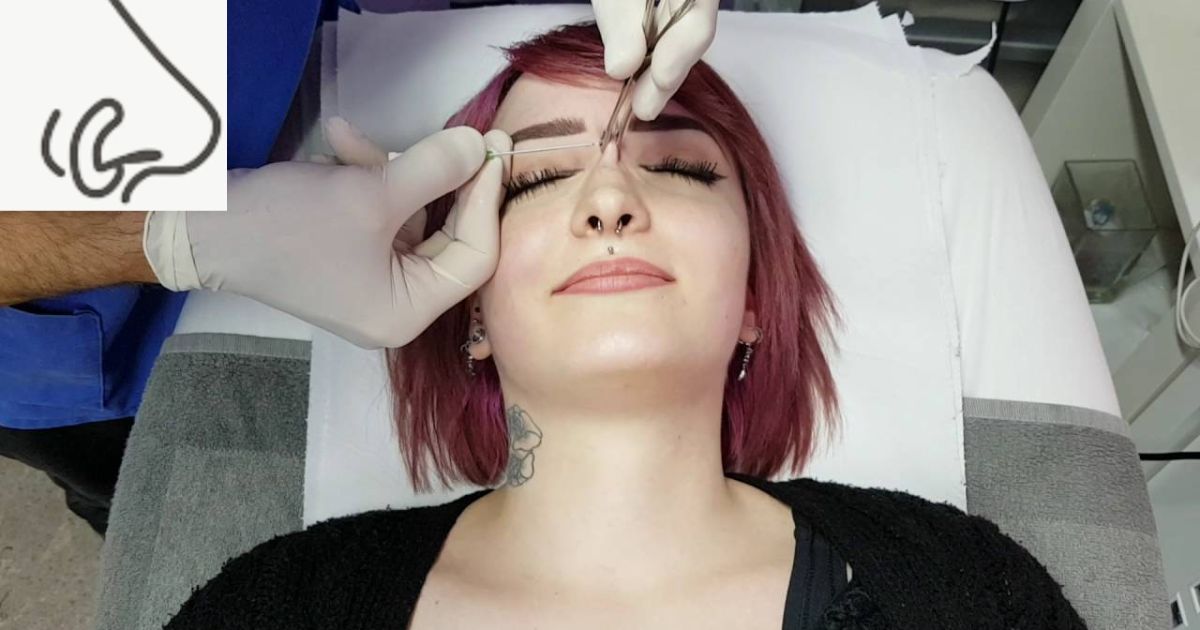Nose piercings have gained popularity as a form of self-expression, but for nurses, this trend raises questions about professionalism and safety. In this comprehensive guide, we will explore whether nurses can have nose piercings and the considerations that come with them.
Imagine a nurse walking into a hospital room, a beacon of care and compassion, adorned with a small, sparkling stud in their nose. It’s a visual statement, an assertion of individuality, but also a topic of debate within the medical community.
Nursing is a field where hygiene, safety, and patient trust are paramount. Can nurses have nose piercings without compromising these essential aspects of their profession? Let’s dive into the world of nose piercings in the nursing profession and discover the dos and don’ts, considerations, and best practices for nurses who want to express themselves while providing excellent care.
Understanding the Nursing Profession
Before addressing the question of nose piercings among nurses, it’s essential to comprehend the dynamics and expectations of the nursing profession. Nurses play a vital role in healthcare settings, providing direct patient care, administering treatments, and ensuring the well-being of those they serve. This profession demands not only medical knowledge and skill but also a high level of hygiene, empathy, and professionalism.
| Topic | Pros | Cons |
| Understanding the Nursing Profession | – Vital role in healthcare | – High standards and expectations |
| – Hygiene and professionalism | – Commitment to hygiene | |
| The Role of a Nurse | – Direct patient care | – Strict standards |
| – Medical knowledge and skill | ||
| The Importance of Hygiene | – Preventing infections | – Adherence to hand hygiene |
| Can Nurses Have Nose Piercings? | – Workplace policies and regulations | – Varying policies |
| – Patient preferences and expectations | – Traditional vs. progressive policies | |
| Workplace Policies and Regulations | – Adaptation to societal norms | – Stricter regulations in some places |
| – Embracing diversity | – Potential distractions | |
| Patient-Centered Approach | – Preferences of the patient | |
| population | ||
| Considerations for Nurse-Pierced Nose | – Choosing easy-to-clean jewelry | – Minimal infection risk |
| – Proper aftercare | – Diligence in maintaining hygiene | |
| – Infection control protocols | – Infection control protocols | |
| Workplace Dress Code | – Specific jewelry guidelines | – Reflecting professionalism |
| – Acceptable attire guidelines | – Compliance with uniform guidelines | |
| Patient Interaction | – Ensuring patient comfort | – Impact on patient experience |
| – Open and respectful communication | ||
| Workplace Policies | – Reviewing policies | – Ambiguities and concerns |
| – Open discussions with supervisors | – Temporary removal policies | |
| The Future of Nose Piercings in Nursing | – Increased acceptance | – Patient-centered approach |
| – Diversity in healthcare | – Focus on cultural competence | |
| – Legal protections | ||
| Conclusion | – Finding a balance | |
| – Expressing individuality | ||
| – Adherence to professionalism |
The Role of a Nurse
Nurses are responsible for various critical tasks, including:
- Administering medication
- Monitoring patients’ vital signs
- Assisting in medical procedures
- Providing emotional support
- Ensuring patient comfort
- Maintaining hygiene and sanitation
- Collaborating with the medical team
Given the diverse and challenging nature of their work, nurses must adhere to strict standards of hygiene, professionalism, and patient safety.
The Importance of Hygiene
Hygiene is a paramount concern in the nursing profession. Nurses are constantly exposed to potentially harmful microorganisms, and they must take all necessary precautions to prevent the spread of infections. This includes adhering to strict hand hygiene, following established sanitation protocols, and wearing clean, appropriate uniforms. The question of body piercings, including nose piercings, becomes relevant in this context.
Can Nurses Have Nose Piercings
The permissibility of nose piercings for nurses is a topic of discussion and can vary widely based on several factors. Let’s explore these factors in detail.
Workplace Policies and Regulations
The primary factor influencing whether nurses can have nose piercings is the policies and regulations of the healthcare facility or institution they work for. These policies may be influenced by various factors, including:
- The institution’s history and tradition
- The prevailing local or national regulations
- The institution’s interpretation of hygiene and professionalism
- Patient preferences and expectations
- Changes in societal norms
As a result, workplace policies regarding nose piercings can differ significantly.
Traditional Healthcare Institutions

Some older and more traditional healthcare institutions tend to have stricter regulations regarding the appearance of their staff, including body piercings. In these settings, visible facial piercings, such as nose piercings, may be discouraged or even prohibited. The rationale behind such policies is often tied to preserving a professional and hygienic image, minimizing potential distractions for patients, and adhering to established norms.
Modern and Progressive Healthcare Facilities
In contrast, many modern and progressive healthcare facilities have adapted to changing societal norms and are more accepting of body modifications, provided they do not compromise patient care, safety, or hygiene. These institutions recognize the importance of embracing diversity and acknowledging that personal expression is a fundamental aspect of individual identity. They often have more flexible policies regarding nose piercings and other body modifications.
Patient-Centered Approach
Patient expectations and preferences play a significant role in shaping the policies of healthcare institutions. Some patients may prefer healthcare providers with a traditional and conservative appearance, while others may appreciate and even expect diversity among healthcare staff. The patient-centered approach means that healthcare institutions may consider the preferences of their patient population when formulating their policies.
Considerations for Nurse-Pierced Nose
For nurses who wish to have nose piercings while working in a healthcare setting, several considerations come into play.
Hygiene and Infection Control
Hygiene and infection control are of utmost importance in healthcare. Any body modification, including nose piercings, must not compromise these principles. Here are some hygiene considerations:
- Jewelry Type: Nurses should choose jewelry that is easy to clean and maintain. Materials such as surgical steel and titanium are popular choices for their durability and ease of cleaning.
- Infection Risk: The risk of infection associated with nose piercings is minimal if proper aftercare is followed. Nurses with nose piercings should be diligent about maintaining good hygiene, such as cleaning the piercing regularly and avoiding touching it with contaminated hands.
- Infection Control Protocols: Nurses must be well-versed in infection control protocols, which include proper hand hygiene, the use of personal protective equipment (PPE), and adherence to sanitation guidelines.
Workplace Dress Code
Understanding and adhering to the workplace dress code is crucial for nurses with nose piercings. Here are some dress code considerations:
- Acceptable Jewelry: Healthcare facilities may have specific guidelines on the type of jewelry that is permitted. It’s essential for nurses to choose jewelry that aligns with these guidelines.
- Professionalism: The appearance of nurses should reflect professionalism. Subtle and inconspicuous nose piercings are generally more acceptable in healthcare settings than larger or attention-grabbing jewelry.
- Uniform Guidelines: Nurses should also comply with uniform guidelines, ensuring that their attire is clean, in good condition, and consistent with the institution’s dress code.
Patient Interaction
Nurses are at the forefront of patient care, and the way they present themselves can impact the patient experience. Here are some considerations related to patient interaction:
- Patient Comfort: Nurses should ensure that their appearance, including nose piercings, does not make patients uncomfortable. It’s essential to prioritize patient care and well-being.
- Open Dialogue: Open and respectful communication with patients can help address any concerns or questions they may have about a nurse’s appearance, including piercings.
Workplace Policies
Understanding and respecting workplace policies is critical for nurses with nose piercings. Here are some policy-related considerations:
- Review Policies: Nurses should take the time to review their workplace policies regarding body piercings. These policies may specify when and where piercings are permitted.
- Discuss with Supervisors: If there are ambiguities or concerns regarding workplace policies, nurses should engage in open discussions with their supervisors or HR representatives.
- Temporary Removal: In some healthcare settings, nurses may be required to temporarily remove their nose jewelry during working hours. Nurses should be prepared to comply with such policies if they exist.
The Future of Nose Piercings in Nursing
The question of whether nurses can have nose piercings is not static; it continues to evolve with changing societal norms, patient preferences, and the approach of healthcare institutions. Here are some trends and possibilities for the future:
Increased Acceptance
As society becomes more accepting of body modifications, including piercings, healthcare institutions may further relax their policies. This could mean that nurses will have more freedom in expressing their individuality through piercings while adhering to the principles of hygiene and professionalism.
Patient-Centered Care
The patient-centered approach in healthcare emphasizes delivering care that aligns with patient preferences and expectations. This means that nurses may have more flexibility in their appearance as long as it doesn’t hinder patient comfort or safety.
Education and Training
Nursing education programs are increasingly focusing on preparing nurses for the realities of the healthcare industry, which includes a diverse and evolving patient population. This education includes discussions on cultural competence, diversity, and personal expression, which can influence the future of body piercings in nursing.
Legal Protections
In some regions, legal protections are in place to prevent discrimination based on personal appearance, including piercings. These legal protections may further encourage healthcare institutions to adopt more inclusive policies.
FAQs
- Are nurses allowed to have nose piercings in healthcare settings?
It depends on workplace policies and regulations.
What types of nose jewelry are suitable for nurses?
Materials like surgical steel and titanium are recommended for hygiene.
- Do nose piercings pose infection risks for nurses?
Proper aftercare and hygiene practices minimize infection risks.
- Can nurses with nose piercings maintain professionalism?
: Subtle and inconspicuous piercings are generally acceptable.
- How can nurses address patient concerns about their nose piercings?
Open and respectful communication with patients is essential.
Conclusion
The question of whether nurses can have nose piercings is multifaceted. It depends on various factors, including workplace policies, patient expectations, and the individual nurse’s commitment to hygiene and professionalism. Nurses who wish to express their individuality through nose piercings must carefully consider these factors and strive to find a balance between personal style and workplace standards.
By doing so, nurses can enjoy the freedom of self-expression without compromising their dedication to patient care and well-being. The future holds the promise of increased acceptance and diversity in the healthcare profession, which may include a broader range of personal expression, including nose piercings for nurses.



















